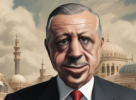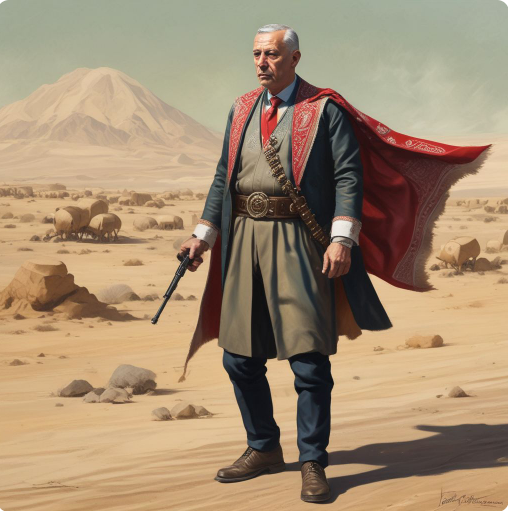 Is Turkey's role in the Middle East, especially regarding its support or provocation of wars and unrest, underestimated? Indeed, it often seems ignored. For instance, during the ongoing genocide against Gaza, much of Israel's oil has come from Azerbaijan, routed through Turkish ports. This raises an unsettling question: has Turkey been implicitly supporting the genocide while Erdogan pretends to champion the Palestinian cause?
Is Turkey's role in the Middle East, especially regarding its support or provocation of wars and unrest, underestimated? Indeed, it often seems ignored. For instance, during the ongoing genocide against Gaza, much of Israel's oil has come from Azerbaijan, routed through Turkish ports. This raises an unsettling question: has Turkey been implicitly supporting the genocide while Erdogan pretends to champion the Palestinian cause?
BRICS: What about BRICS? This coalition is touted as a counter to imperialism, yet it’s perplexing to see countries like Turkey, Azerbaijan, and even India as members. India, for example, is pro-Israel and treats its Muslims in Kashmir similarly to how Israel treats Palestinians in the West Bank. While the situation may not be as dire as in Gaza, it’s still shocking.
Frenemies: Is India conducting carpet bombing on Kashmir the way Israel is on Gaza? No, but it has essentially cancelled the region's autonomy and imposed military occupation. So, what of Russia's stance? Does it support Israel? In a twisted way, yes. They have voiced objections to Iranian presence in Syria, ostensibly to protect Israeli interests. It’s baffling to me that anyone would prioritize Israel, especially when it continues its violent actions against Palestinians.
Is RT, the Russian media outlet, a reliable voice of the Russian government? Most likely, yes. The narratives presented align closely with government perspectives. But should we advocate for open dialogue with Israel, akin to what we now expect regarding Russia and Ukraine? The reality is, with a regime like Israel's, dialogue seems a necessary luxury.
Yemen: The Yemeni government’s blockade of Israeli ships reflects the kind of stance that is warranted.
Why is Israel not treated as an international pariah, despite its crimes? While many Western governments criticise Israel, they often gloss over the atrocities committed against Palestinians. This raises another question: is Turkey any worse than other nations involved in the region’s conflicts,? Clearly, Turkey poses a threat to the region, and one might prefer the previous Syrian government over the current Turkish regime.
An Israeli-Ottoman Empire? Will Turkey ever go to war against Israel? That notion seems far-fetched. Yet, could we see a resurgence of an Israeli-Ottoman Empire if Israel expands its territory into Lebanon and beyond? In a sense, that’s already occurring; the current Syrian government is effectively a puppet of Turkey, marking a modern extension of the Ottoman Empire.
The Kurds: What about the Kurds, whom Erdogan designates as enemies? The situation is complex. During the Syrian conflict, the Kurds allied with terrorist factions against the Assad government, taking support from American soldiers illegally on Syrian soil. The Syrian government, often vilified, had planned to grant autonomy to the Kurds within a federal structure. Why then did the Kurds align with foreign interests, particularly the Americans? An obvious beneficiary of this dynamic appears to be Israel.
Erdogan likes to use the Kurds as a bogeyman. Within Turkey, Kurds lack national rights compared to those in Syria, where they might have enjoyed more autonomy. What threat do the Kurds pose, according to Erdogan? He likely argues that their aspirations threaten Turkey's territorial integrity, justifying their political repression.
Geopolitics: In the context of geopolitics, we see Russia and Azerbaijan cooperating on an oil transport route that extends from Russia, through Azerbaijan, to India via Iran. Is Russia supplying Israel with oil and gas? It’s hard to say definitively, but supporting a despotic regime in Azerbaijan, which facilitates the genocide in Gaza, raises serious ethical concerns. How does this pipeline factor into the broader narrative?
Whoever controls Israel and the surrounding region holds significant sway over global petroleum reserves and their transportation. But what are the implications? The world relies on this energy for cities, transportation, and mechanised agriculture. It’s the foundation of our modern economy, which has evolved from wood and water to coal and now fossil fuels. We may talk of a post-petroleum economy, but both hot wars and economic wars continue to be fought over oil and gas.
Morality and Pragmatism: There are two ways to approach this discussion: morally and pragmatically. The first emphasizes ethical considerations, while the second focuses on the practicalities of satisfying energy demands. But at what cost? Are we willing to abandon our moral needs, adapting to the brutal annihilation of men, women and children, who get in the way of imperial demands?
While morality may seem like a luxury today, tomorrow it might be our only protection from being similarly sacrificed to pragmatic demands. If our governments condone Israel’s treatment of Palestinians, they may well tolerate similar treatment for the rest of us. In this way, morality is also pragmatic.

Add comment